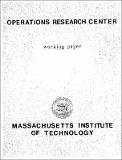| dc.contributor.author | Eckels, Timothy J. | en_US |
| dc.date.accessioned | 2004-05-28T19:26:03Z | |
| dc.date.available | 2004-05-28T19:26:03Z | |
| dc.date.issued | 1979-12 | en_US |
| dc.identifier.uri | http://hdl.handle.net/1721.1/5165 | |
| dc.description.abstract | A potentially powerful design for the evaluation of public programs is one which combines an assessment of program processes with an experimentally oriented analysis of program outcomes. Relatively little has been written, however, on how these two evaluation approaches can best be combined. This paper proposes a framework for sequencing, in a complementary and integrated manner, elements of process evaluation and experimental or quasi-experimental design. A number of assessment sequences are proposed, and the strengths and drawbacks of each are outlined. Five evaluation studies in the criminal justice field are then discussed in order to illustrate the potential of these sequences. The paper concludes with a summary of how an experimental design and experimental outcomes can be affected by the supportive use of process evaluation. | en_US |
| dc.description.sponsorship | Prepared under Grant Number 78NI-AX-0007 from the National Institute of Law Enforcement and Criminal Justice, Law Enforcement Assistance Administration, U.S. Department of Justice. | en_US |
| dc.format.extent | 1746 bytes | |
| dc.format.extent | 3710799 bytes | |
| dc.format.mimetype | application/pdf | |
| dc.language.iso | en_US | en_US |
| dc.publisher | Massachusetts Institute of Technology, Operations Research Center | en_US |
| dc.relation.ispartofseries | Operations Research Center Working Paper;OR 094-79 | en_US |
| dc.title | Toward a Framework for Process Evaluation | en_US |
| dc.type | Working Paper | en_US |

